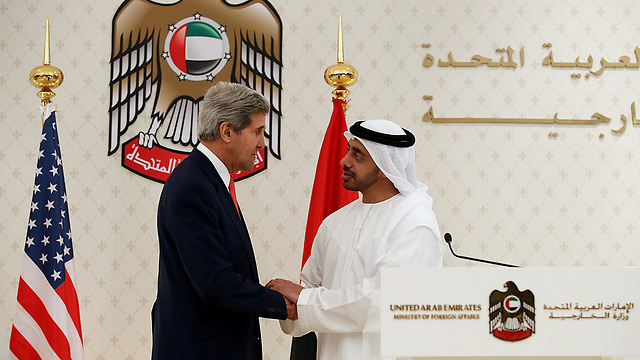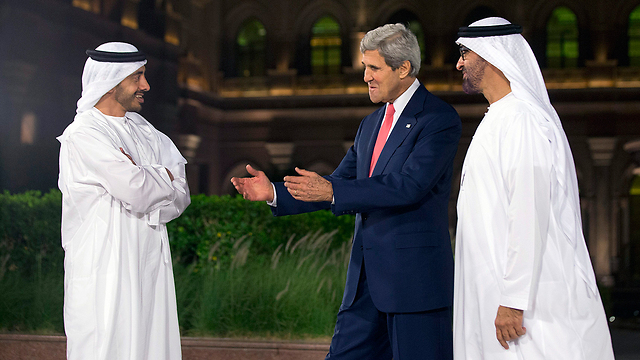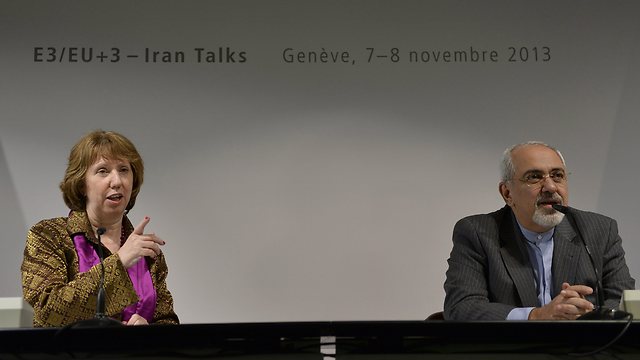US Secretary of State John Kerry said Monday that the major powers were unified on an Iran nuclear deal during weekend talks in Geneva but the Iranians were unable to accept it.
He also said critics of the plan should withhold their comments until a deal is reached, leveling the most direct criticism of Prime Minister Benjamin Netanyahu yet.
Related stories:
- Netanyahu stresses knowledge of Iran deal
- Netanyahu: I asked world leaders to wait with Iran deal
- Rohani says nuclear rights are 'red lines'
Speaking to reporters in Abu Dhabi, Kerry said the United States and its negotiating partners were unified on Saturday when the proposal was presented to the Iranians. "The French signed off on it, we signed off on it," Kerry said.
Earlier reports said that the talks came apart because France refused to accept the deal with Iran. But acording to Kerry, the powers were "unified on Saturday when we presented a proposal to the Iranians, and the French signed off on it, we signed off on it, and everybody agreed it was a fair proposal. There was unity, but Iran couldn't take it at that particular moment, they weren't able to accept that particular thing."
Kerry further noted that Israeli Prime Minister Benjamin Netanyahu's rejection of a deal to limit Iran's nuclear ambitions was premature.
"The time to oppose it is when you see what it is, not to oppose the effort to find out what is possible," Kerry said, adding that the US has "been meeting constantly" with the Israelis to understand the progress Iran has made in its nuclear program. "We are confident that what we are doing can actually protect Israel more effectively and provide greater security," he said.
Thumping the podium, Kerry said President Barack Obama had said "that he will continue to defend his friends and allies in this region, the UAE, Saudi Arabia, others, he will defend them against any external attack.
"That is the promise of the United States and as I stand here as Secretary of State, as long as I'm Secretary of State, that is also our policy, my policy, representing the President of the United States in executing it."
Kerry noted that for the US there is no "end game" in motion and the Geneva talks were a first step in longer process of possible give and take.
Rising tensions
Earlier Monday, US Ambassador Dan Shapiro sought to quell Israeli fears over an emerging deal with Iran, vowing that Washington would never let Tehran acquire a nuclear weapon.
"On this crucial issue the US and Israel share an identical agenda," Shapiro told delegates attending the General Assembly of the Jewish Federations of North America in Jerusalem.
US President Barack Obama "has made it crystal clear that he will not permit Iran to acquire a nuclear weapon period, and is prepared to use all elements of our national power to ensure that we are successful," he said.
His remarks were made as the US and Israel were locked in an escalating war of words over negotiations between world powers and Iran in a bid to halt its nuclear program, which is widely believed to be a front for developing a military capability.
Diplomats have said they are closing in on an interim agreement that would freeze or curb some of Iran's nuclear activities in exchange for an easing of the tight sanctions on the Islamic republic, after failing to secure a deal at weekend crunch talks in Geneva.
In recent days, Israel's Prime Minister Benjamin Netanyahu has furiously denounced the emerging agreement as "dangerous" reaching out to world leaders and to the American public to get his point across.
Reuters and AFP contributed to this report
- Receive Ynetnews updates
directly to your desktop


















